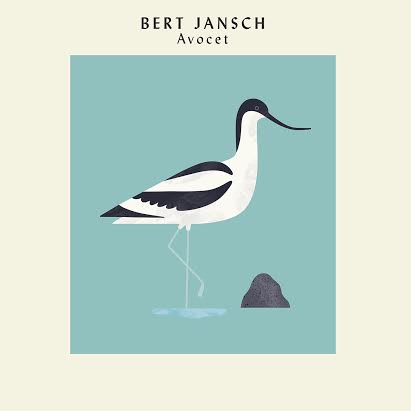1979 might not initially appear to be a vintage year for Bert Jansch, the perennially influential and innovative acoustic guitarist and proponent of the complex, counterpoint-heavy guitar style known as folk baroque. It was over a decade since he’d made a name for himself as a Beat-influenced troubadour and progenitor of fiery folk-jazz hybrids as a member of Pentangle, and though still loved by a coterie of musicians and journalists unaffected by the politically-charged trad scene of the time, he was struggling to maintain a career as a performing artist. Though it was at this time that he released Avocet, an ornithologically-themed instrumental album centred around one side-long composition. Now lovingly released by Earth Recordings, this album sees Jansch at the height of his compositional powers.
The sense of ease, flow and romantic naturalism seen on Avocet was thoroughly out of step with post-punk’s aggressive modernism but nevertheless remains central to Jansch’s theme and aesthetic throughout his career. An obstinate rambler and musical autodidact, Jansch was never the one to move with the times, but rather to keep ploughing his own furrow and developing his art. It’s something that can be seen in abundance in the understated elegance of this album, a compositional feat taking in all of Bert’s influences up to this point, including jazz, blues, baroque and classical music, and folk.
For the project Jansch recruited erstwhile collaborator Danny Thompson, the upright bassist who underpinned Pentangle and so many songs from the Brit-folk canon, from John Martyn to the Incredible String Band. Also along for the ride was Martin Jenkins, formerly of Dando Shaft, whose contributions on violin, mandocello and flute bring much to the album’s spare but bright sound palette. Masterfully orchestrated, the strong group dynamic felt here is one of the record’s strengths – overdubs are minimal and each piece is driven along by the interlocking efforts of the three players. The guitar theme from the 18-minute title track blows in like a gust of warm sea breeze, whilst Jenkin’s violin figures flicker and flurry like a bird in the wind. After a three-minute introduction comes a section of jazzy improvisation as the folk roots of the piece, inspired by the traditional song ‘The Cuckoo’, are stretched to their absolute limits. Though the piece lends itself strongly to themes of the natural world, it’s not all easy-going naturalism. Time changes are occasionally abrupt and unsettling, whilst Jansch’s rolling fingerpicking can at times create a tremendous sense of momentum. The final third of the title track sees the introduction of a characteristically Janschian theme, with Jenkin’s overblown flute and Jansch’s flanged guitar giving the coda a gently acidic edge and making for a rewarding landing.
Though ‘Avocet’ is certainly the album’s centrepiece, there’s certainly more on the album to explore. ‘Lapwing’ illustrate both Jansch’s affinity for baroque music as well as his skills as an able pianist, whilst the fairly pedestrian folk-jazz of ‘Bittern’ is made interesting by Danny Thompson’s monstrous bass solo, which takes in full-on atonality as well as elements of Indian raga. John Martyn’s world-weary temperament certainly cast a long shadow over ‘Kingfisher’, illustrating how Bert’s status as a catalyst for new UK folk guitar stylings was by now going both ways. The rather slight ‘Osprey’ feels merely like a highly proficient group of musicians flexing their virtuosic muscles, however ‘Kittiwake’, a close cousin of the title track, provides a wistful yet subtly complex ending for the album.
We’re arguably in a better place to receive this album now than when the album was first released in 1979. Without the aesthetic anxieties of that era we can appreciate Avocet for what it is: an interesting detour in the career of a phenomenally important British artist. With the influence of Jansch strongly felt in large areas of "alternative" guitar music today (from Kurt Vile to Steve Gunn, to Ryley Walker and even Thurston Moore), as well as the post-Electric Eden resurgence of all things Brit-folk, the time now seems ripe to come to Avocet with a fresh pair of ears. What’s more Earth Recordings have ensured this doesn’t come off as just another standard reissue, with the album coming with new artwork and art prints. Perhaps not a place to begin for the uninitiated, but those looking to explore Bert Jansch’s catalogue further could do worse than picking up Avocet.


